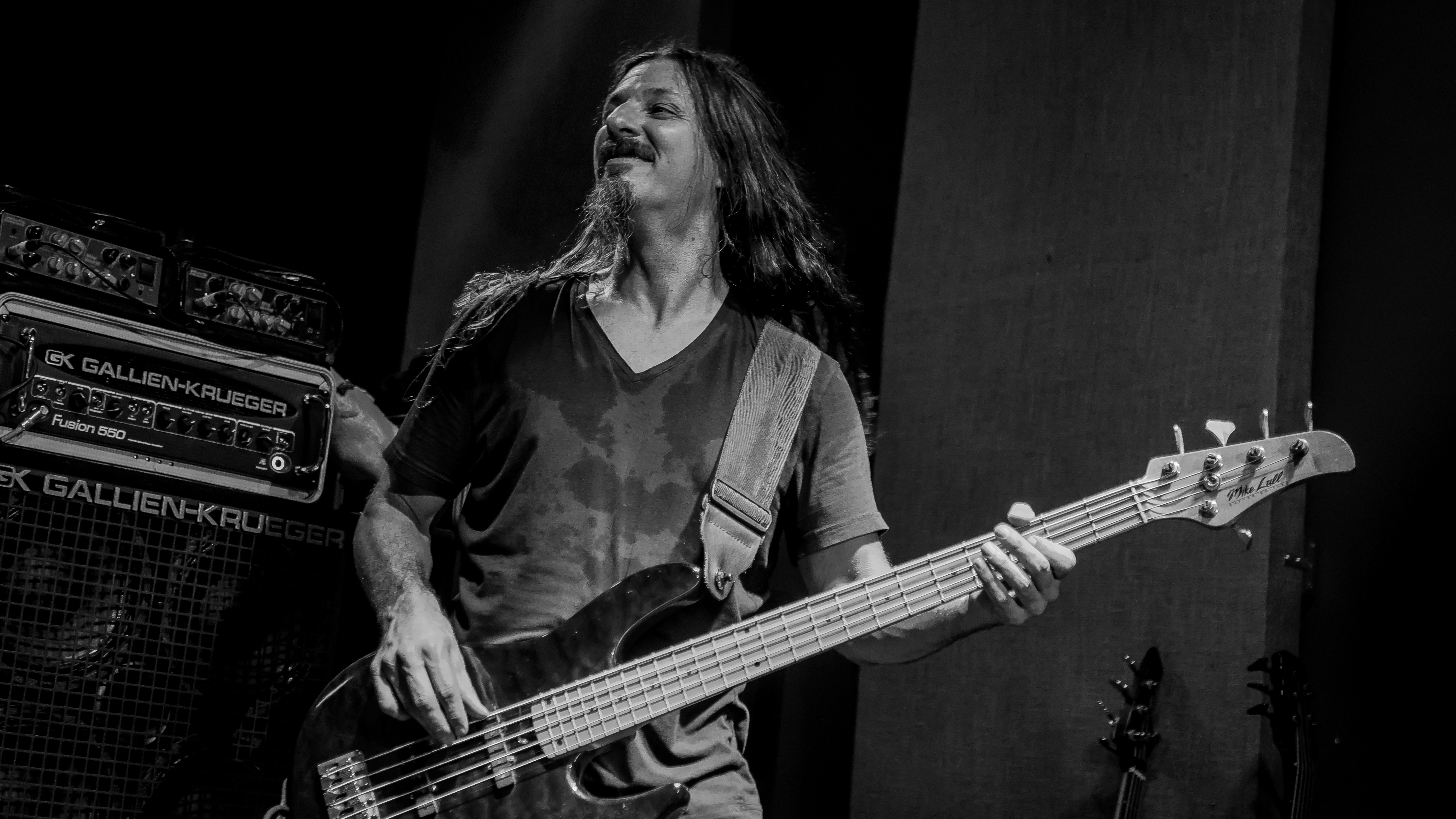Bryan Beller: “With the Aristocrats, there’s a licence to do anything... and we have fun with it”
The Aristocrats bassist and solo artist is on productive form

Want all the hottest music and gear news, reviews, deals, features and more, direct to your inbox? Sign up here.
You are now subscribed
Your newsletter sign-up was successful
As a solo artist and member of the Aristocrats, Bryan Beller finds himself in the best of both worlds.
With guitarist Guthrie Govan and drummer Marco Minnemann, he says, it’s “a rollicking outfit. We’re doing outrageous things, winking and nodding at the audience, and breaking the fourth wall all the time, so it’s kind of a tricky muso act, but we’re also having a lot of fun and breaking all the rules. Then there’s the deeper, more emotional, reflective part of me, which is where my solo material goes.”
When he spoke to us, Beller was in the stressful but enviable position of promoting two albums: The Aristocrats’ You Know What...? and his Scenes From The Flood, an ambitious, 18-song, two-CD/LP project clocking in at 88 minutes. It’s a lot for anyone, even a self-described workaholic - but with over 25 years of professional experience as a multi-instrumentalist, arranger, composer, producer, studio/ touring musician (Steve Vai, Joe Satriani), and band member, he takes it all in stride.
I had to rebuild an arsenal I spent 20 years cultivating in short order
He began both albums from an unfortunate starting point: in 2016, most of his instruments were stolen, including his number one bass guitar: a 1999 Mike Lull Modern five-string. “I was starting over with a threadbare cupboard in terms of basses that were available to make first my solo album and then the Aristocrats’ album,” he says, “and I had to rebuild an arsenal I spent 20 years cultivating in short order.”
You Know What...? follows the trajectory of its predecessors: three musicians, three songs each, recorded live in the studio. “With the Aristocrats, there’s a licence to do anything,” says Beller.
“We can do any style we want, as long as it works in a trio format and we have fun with it. Those are the only requirements. Of the three songs I contributed, D Grade Fuck Movie Jam is like a full-on 70s cock-rock Hendrix/Zeppelin throwback, All Said And Done is a Beatles pastiche, a slow, mid-tempo, heavy groove tune with a very simple melody, and the third one is a certain kind of 70s progressive rock vibe that isn’t explored enough, I think, which is the mid-tempo rock shuffle.
"I wanted to write a song about the whole adventure of my instruments getting stolen and me eventually finding the people who did that and then leading the police to their arrest, so I named that song ‘The Ballad Of Bonnie And Clyde.’”
Want all the hottest music and gear news, reviews, deals, features and more, direct to your inbox? Sign up here.
Scenes From The Flood was an entirely different undertaking. Described as a “concept album that explores ambition and loss, intentionality and reality, hope and disillusionment,” Beller spent years working on the material: iPhone voice memos, a text file with song titles, music and arrangements that he heard in his head before recording a note.
“When I finally started demoing it in 2017, I knew what the names of all 18 songs were, I knew what the sequence was, and I knew what the music was,” he says. “It was just a matter of bringing it into the reality that other people could experience.”
My next guest...
After eight months of working on the demos, the songs were ready. He brought in 26 guest musicians - some in person, some remote; among them Joe Satriani, John Petrucci and Mike Keneally - and once the tracks were ready, he chose Forrester Savell (Karnivool) to mix, a process that took another nine months.
The result is an epic work, available as a vinyl double-album, two-CD package, and for downloading and streaming, worthy of old-fashioned, headphones-and-lights-out repeated listening sessions.
Beller has a long history with Mike Lull Custom Basses and Gallien-Krueger amps; look for his new signature bass, the BBMF5, onstage, as the Aristocrats spend the remainder of this year on tour.
The gear figures prominently on the new albums, but as he explains, his quest for perfect tone draws lessons from both vintage and modern approaches.
I’m pretty demanding in my technical specifications for fretboard setup and string height, and not every bass or neck can hang with that
“For the vintage style, I find that the Mike Lull instruments are the best five-string representations of the classic Fender Ps and Js, with a 35” scale, and incredible playability and great tone from the top of the neck to the bottom, which is very important to me,” he says.
“I set the action fairly low, and I’m pretty demanding in my technical specifications for fretboard setup and string height, and not every bass or neck can hang with that, but the Lulls get it done. I have a five-string PJ, which is an alder body with a rosewood fingerboard.
"That’s a fairly dark, rich, P-enhanced sound. I used that for a couple of tracks on the solo album. I did get a replacement for my Modern 5, which is a bright, five- string Jazz bass. It was another ’99, which was close to it but not really. I used it for a couple of demo tracks anyway.
“For the modern stuff, I went a completely other direction and started using Spectors, which have this great, smooth, compress-y, midrange-focused kind of sound. I have a Spector Forte 5 with an ash body and an ebony fingerboard. I used that for a couple of sparkly-sounding things, very modern piano-strings-sounding bass guitar tunes and moments. Spectors do a good job of cutting through metal mixes with the EMG electronics set: the EMG DC40 pickups, and the BQC preamp and EQ.
“For a lo-fi option, I used an Ibanez SRX505. I like the weird kind of low-mid honk to it. I put a Full Contact Babicz Bridge on it, ripped the electronics out and put in Carey Nordstrand Music Man replacement electronics, which are really great, had the neck redone and Pleked, and this little beater, this Frankenstein, is now punching way above its weight.
"It sounded great for some of the stuff I played with a pick on the solo album, and I used it for some fingerstyle bridge-pickup round-sounding stuff on the Aristocrats album.”

Don’t look back
One week prior to tracking You Know What...?, Beller located a 1998 Mike Lull Modern 5.
“The original owner, who had it for 20 years, passed away, and his widow reached out to Mike Lull himself to find a new owner for it,” he says, “It was only five production units away from my original that was stolen - so that good old rowdy sound that people may ultimately come to recognise is there on three songs: Terrible Lizard, Last Orders, and D Grade Fuck Movie Jam. The Spector, meanwhile, was used on Spanish Eddie and When We All Come Together.
You just can’t go back. They don’t make them any more because materials change
“I’m glad I have the Lulls again - the passive PJ Lull, the dark-sounding one, and now my ‘new-old’ 1998 bright vintage Jazz, but it was a difficult adventure trying to go back in time and recreate some of the things I had,” he says. “You just can’t go back. They don’t make them any more because materials change. No two instruments are alike. So it was a tough loss, but life goes on.”
The Aristocrats tracked at Brotheryn Studios in Ojai, California, where Beller set up his G-K rig.
“We were recording four tracks with some nice tube DIs,” he says. “I don’t usually mic the cab in an amp rig to record, but in this case we did, to give it more of an old-school vibe, which I thought was cool. And here’s the dirty little secret: for my solo album, which I spent countless hours going over every single sonic detail, what’s the bass? It’s all from the demos. I didn’t re-record any of it. Maybe a couple of passages here and there, but for the original tracking, half of it was through an Mbox Mini.
“In the second half of the album I finally got an Apollo Twin and used the Neve plug-in and the 1176 compressor plug-ins, so it was a better source. But I was just thinking in terms of creative and songwriting mode. I wasn’t thinking in terms of ‘This has got to be the most tricked-out signal chain ever to capture this bass’. And when I went back and listened to it, it was all there.
“Going back to the Aristocrats side, having everything recorded in one room through the same rig, and using four channels and tube DIs and miking the cab does produce a fuller, rounder sound, but the Aristocrats are a trio, and so the bass needs to take up a lot more space than in an arrangement where there’s a hundred tracks. It’s different roles for different applications, and hopefully, in the end, the appropriate ones.”

